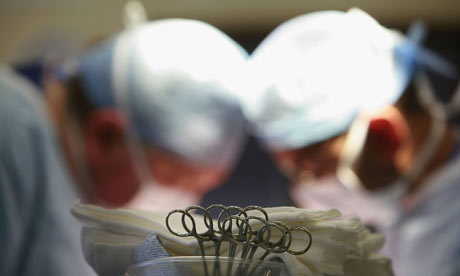
The claim
Ted Kennedy, 77, would not be treated for his brain tumour if he was in Britain because he is too old – Charles Grassley, Republican senator from Iowa.
The response
Untrue, says the Department of Health. "There is no ban on anyone of any age receiving any treatment, " said a spokesman. "Whether to prescribe drugs or recommend surgery is rightly a clinical decision taken on a case by case basis."
The claim
Government health officials in England have decided that $22,750 (£14,000) is what six months' life is worth. Under their socialised system, if a medical treatment costs more, you're out of luck - Club for Growth
The response
The National Institute of Health and Clinical Excellence (Nice) decides whether new drugs represent value for money for the NHS in England and Wales. It replied: "This is a gross misrepresentation of how Nice applies health economics to try and address the central issue: how to allocate healthcare rationally within the context of limited healthcare resources. Nice assesses the cost of a treatment in terms of a cost-utility analysis which takes account of the quality adjusted life year – the amount and quality of extended life it is hoped the patient will gain. The current ceiling is £30,000 but exceptions are made."
The claim
In England, anyone over 59 years of age cannot receive heart repairs, stents or bypass because it is not covered as being too expensive and not needed – an anonymously authored, but widely circulated, email, largely sent to older voters
The response
Totally untrue. Growing numbers of patients over 65 with heart conditions are having surgery, including valve repairs and heart bypass surgery, says Professor Peter Weissberg, the British Heart Foundation's (BHF) medical director. For example, the average age at which people have a bypass operation has risen from 58 in 1991 to 66 in 2008.
The claim
Breast cancer kills 46% of its targets in Britain, compared with 25% in the US; prostate cancer kills 57% of the Britons it strikes, compared with 25% of American victims; Britain's heart attack fatality rate was 19.5% higher than America's in 2005 – Pacific Research Institute, a San Francisco-based thinktank
The response
Breast cancer does claim more lives, proportionally, here than in the US. According to the 2002 Globocan database run by the World Health Organisation's cancer advisers, 19.2 of every 100,000 Americans die of the disease, but 24.3 per 100,000 here die. On prostate cancer, a Lancet Oncology global study last year found that 91.9% of Americans with the disease were still alive after five years compared to just 51.1% in the UK. With heart attacks, 40% of Britons who suffer one die from it compared to 38% in the States – nowhere near the difference claimed.
The claim
In Britain, 40% of cancer patients are never able to see an oncologist; there is explicit rationing for services such as kidney dialysis, open heart surgery and care for the terminally ill – Conservatives for Patients' Rights
The response
"The claim that 40% of cancer patients are never able to see an oncologist comes from a 15-year-old study which is completely out of date. Since then we have had the Nice Improving Outcomes Guidance series and the NHS Cancer Plan for England, which has increased the number of cancer consultants and established specialist multidisciplinary teams," said Duleep Allirajah of Macmillan Cancer Support. However, "some people with serious kidney failure are unable to obtain dialysis on the NHS and die", said Tim Statham, chief executive of the National Kidney Federation. "Some parts of the NHS can't cope, because patient numbers are increasing by 6% a year, which is a huge burden. Of about 100 renal units in the UK, probably 20% are working at 100% capacity or above," he added. The claim about open heart surgery is not true, said the BHF's Weissberg. "There's no explicit rationing. Some people don't get treatment, but those decisions are made solely on the basis of clinical criteria and their risk of dying. We only operate on people who are likely to benefit and not die." The three main political parties agree that Britain provides good quality end-of-life care but that access to it can be patchy, depending on location and the patient's condition. The government is working to improve the situation.
The claim
In the UK, breast cancer survival rates are 11% lower than they are here in the United States – Sue Myrick, a Republican congresswoman from North Carolina
The response
If anything the gap is wider than Myrick says. Breakthrough Breast Cancer cite two recent studies from Lancet Oncology. One says that 83.9% of women in the US diagnosed with breast cancer between 1990-94 lived for at least five years compared to 69.7% in the UK – a 14.2% difference. The second showed that, among women diagnosed with the disease in 2000-02, 90.1% in the States survived for at least five years whereas in England it was 77.8% – a 12.3% gap.
The claim
The British healthcare system is infamous for denying state-of-the-art drugs to cancer patients – National Center for Policy Analysis
The response
Nice has recently reformed its procedures after a series of controversies over the unavailability of certain cancer treatments. "The vast majority of new cancer drugs are made available to patients with notable exceptions, such as the likely rejection of several new kidney cancer drugs," said Allirajah of Macmillan Cancer Support. "However, the Nice process does need reforming to ensure decisions are made more quickly and patients' quality of life is taken more into account."
The claim
The British NHS "does not allow" women under 25 to receive screening for cervical cancer – Jim DeMint, Republican senator from South Carolina
The response
The NHS invites women in Wales, Scotland and Northern Ireland to attend for cervical cancer screening from 20 upwards. But in England screening for the disease starts at 25. That policy was recently reviewed and remains unchanged.

